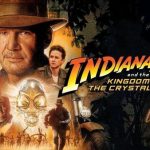“Black Water (2007)”
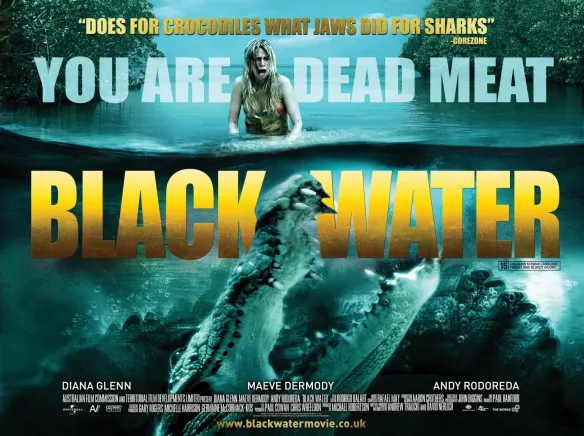
“Black Water” (2007) is an Australian survival horror-thriller directed by Andrew Traucki and co-written by Traucki and David Nerlich. Based on true events, the film tells the story of a group of tourists who find themselves stranded in a mangrove swamp and hunted by a massive, predatory saltwater crocodile. Known for its tension-filled atmosphere and minimalist approach, Black Water stands out as a gripping and realistic take on the survival horror genre.
Plot Summary
The story revolves around Grace (Diana Glenn), her sister Lee (Maeve Dermody), and Lee’s boyfriend Adam (Andy Rodoreda), who take a trip to northern Australia for a relaxing holiday. The trio decides to go on a scenic boat tour of the local mangrove swamps. However, the trip takes a deadly turn when their boat capsizes after a saltwater crocodile attacks.
The group becomes stranded in the swamp, surrounded by rising waters, with no way to escape. They take refuge in a small tree and attempt to figure out a way to survive, but the crocodile lurks nearby, waiting for an opportunity to strike. As they try to figure out how to escape, the film builds on the psychological horror of being trapped in an unforgiving environment, while also dealing with the presence of the terrifying predator stalking them.
The tension escalates as the crocodile’s attacks become more frequent, and the group’s resources, both physical and emotional, dwindle. They must make difficult choices and take life-threatening risks if they are to survive the predator’s relentless pursuit.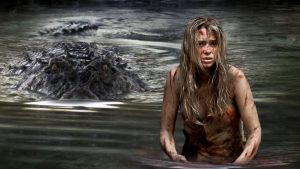
Key Themes
- Survival and Resourcefulness: Black Water revolves around the basic human instincts of survival. The group must work together, stay calm, and use their wits to escape the terrifying situation they find themselves in. The film emphasizes the harsh reality of survival in a dangerous and unforgiving environment.
- Isolation and Vulnerability: Stranded in a remote and desolate mangrove swamp, the characters are cut off from help, and the hostile environment adds a sense of hopelessness. The isolation makes them vulnerable not just to the crocodile, but to the psychological pressures of being stuck in a life-or-death situation.
- Man vs. Nature: The crocodile is not portrayed as a mindless monster but as a creature of nature, acting in accordance with its instincts. The film explores the idea that, in nature, humans are not at the top of the food chain, and when faced with a powerful predator, the roles of hunter and prey are reversed.
- Fear of the Unknown: Much of the horror in Black Water comes from the constant threat of the unseen crocodile lurking in the murky waters. This fear of the unknown, amplified by the film’s use of minimal lighting and claustrophobic environments, heightens the tension and makes the predator all the more terrifying.
Cinematography and Direction
Black Water is noted for its minimalist and atmospheric approach to horror. The film takes place almost entirely in the swamp, and the natural setting is used to great effect to create tension and a sense of confinement. The cinematography by David Nerlich and Andrew Traucki enhances the film’s realism, with close-up shots of the swamp’s murky waters and the characters’ fearful expressions. The use of natural lighting and quiet moments, where the sounds of nature amplify the tension, keeps the audience on edge.
The film’s slow burn narrative is key to building suspense, with the crocodile’s presence felt before it is seen. The creatures lurking in the water are a constant threat, but the audience is kept in the dark about when and how they will strike, creating an intense sense of uncertainty.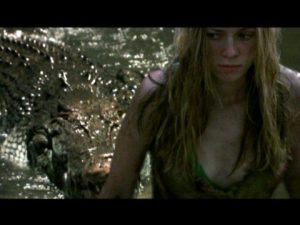
Performances
The film’s success is due in part to the strong performances from its small cast. Diana Glenn as Grace and Maeve Dermody as Lee deliver emotional, grounded performances that make the viewer care about their survival. Andy Rodoreda’s portrayal of Adam, the level-headed boyfriend, adds a necessary dynamic to the group, as they all must rely on each other to navigate the dangers of the swamp.
The lack of exaggerated melodrama helps Black Water feel realistic and relatable. The characters’ fears and frustrations are portrayed in a way that resonates with the audience, making their plight more immediate and engaging.
Realism and Practical Effects
One of the most notable aspects of Black Water is its commitment to realism. The crocodile is portrayed as a real animal rather than a supernatural or exaggerated monster, which heightens the film’s sense of danger. The filmmakers used a combination of practical effects, animatronics, and CGI to bring the crocodile to life in a way that feels authentic. The film avoids over-the-top gore or sensationalism, relying instead on its tense atmosphere and the terrifying idea of being hunted by a predator in a remote, hostile environment.
The film also plays with the idea that the characters’ struggle for survival is rooted in their lack of experience in this environment, making their decisions and actions feel more believable and relatable. The absence of over-the-top action sequences gives the film a more grounded and disturbing quality.
Reception
Black Water received positive reviews from critics for its realistic portrayal of survival horror, its intense atmosphere, and the suspense created by the crocodile threat. It is often praised for its effective use of minimalism and its slow-building tension. The film has become a well-regarded example of natural horror, particularly in the subgenre involving animals.
The film’s strength lies in its ability to create fear from simple, primal ideas—being trapped, hunted, and surrounded by nature’s raw power. It also appeals to fans of slow-burn horror that relies on suspense rather than excessive violence.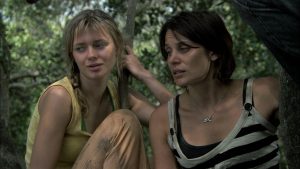
Cast and Crew
- Director: Andrew Traucki
- Writers: David Nerlich, Andrew Traucki
- Cast:
- Diana Glenn as Grace
- Maeve Dermody as Lee
- Andy Rodoreda as Adam
- Ben Oxenbould as Jim
- Tony Bonner as Ray
Fun Facts
- The crocodile in the film is portrayed by a real saltwater crocodile, which adds to the authenticity and realism of the film. The filmmakers ensured that the animal was treated humanely and safely during production.
- The film was inspired by real-life crocodile attacks and the danger posed by saltwater crocodiles in Northern Australia.
- The film was shot on location in Northern Queensland, Australia, utilizing the natural environment to create a more immersive and realistic setting.
Conclusion
Black Water is a standout example of survival horror, effectively combining natural elements with the primal fear of being hunted. Its realistic portrayal of the dangers of nature and the threat of a powerful predator make it a tense and gripping experience. The film’s slow-building suspense, grounded performances, and atmospheric cinematography contribute to its reputation as a compelling and chilling entry in the genre. It’s a must-watch for fans of survival horror and natural thriller films.










